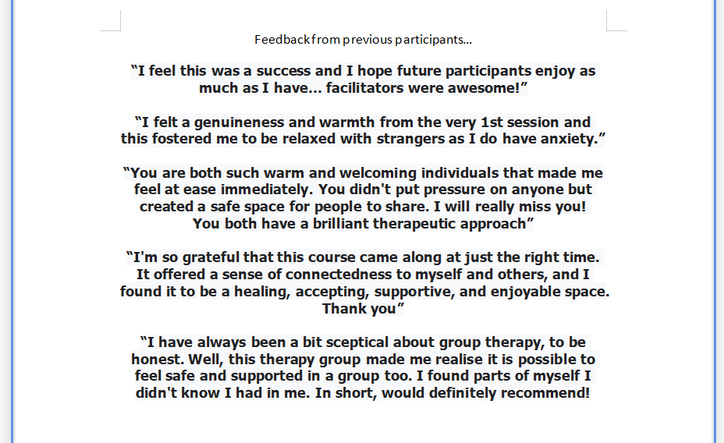Mindfulness-Based Group Therapy
An Introduction From Raquel & Katherine About This Type Of Therapy
Join our Free Taster Session, To See If This Could Be Right For You...
Current sessions available for young women aged 18-25. CLICK HERE for more information
What is Mindfulness-Based Group Therapy?
We cultivate a depth of self awareness, so that we can be empowered to know ourselves and our experiences more deeply, to understand what is happening for us and what our particular flavour of suffering looks like. From this we learn how to respond lovingly and compassionately to our own needs, which organically restores a sense of well-being.
Through this process, we have seen people overcome deeply intrenched patterns of suffering and make remarkable shifts in their lives. This is not always an easy process, but one we can wholeheartedly recommend for long-term healing benefits.
Through this process, we have seen people overcome deeply intrenched patterns of suffering and make remarkable shifts in their lives. This is not always an easy process, but one we can wholeheartedly recommend for long-term healing benefits.
What is included in the group sessions?
Within the sessions, we will offer you some educational input on a range of topics, as well as spending time in break-out groups to explore how different issues effect you and what can help. This will include:
* Having a held, safe space to share your difficulties and receive skilled, therapeutic support
* Guided meditation at the beginning and end of each session
* Educational input supporting how to manage your own well-being
* Having therapeutic support from a highly skilled Mindfulness-based Psychotherapist (Ma)
* Being part of a supportive small community as you go through therapy
Within the sessions, we will offer you some educational input on a range of topics, as well as spending time in break-out groups to explore how different issues effect you and what can help. This will include:
* Having a held, safe space to share your difficulties and receive skilled, therapeutic support
* Guided meditation at the beginning and end of each session
* Educational input supporting how to manage your own well-being
* Having therapeutic support from a highly skilled Mindfulness-based Psychotherapist (Ma)
* Being part of a supportive small community as you go through therapy
Benefits of Mindfulness-Based Group Therapy:
1. Group therapy helps you realize you’re not alone.
According to research, many people enter therapy feeling they are unique in their struggles. They are the only one having the problems they have. When you work with your difficulties in a group setting such as this, these illusions can quickly be dispelled. While it’s true that each of us is unique and may have unique circumstances, none of us are alone in our struggles. Group therapy tends to reduce isolation and alienation. It increases the sense that “we’re all in this together,” and can normalise suffering.
2. Group therapy facilitates giving and receiving more support.
With some types of difficulties, it can be really hard to see reality on our own, to work out what is true, and how we are really perceived by others. One of the benefits of group therapy is that it can help to dispel myths we may have created about ourselves. A misconception about group therapy is that members take turns receiving individual therapy from the therapist while others observe. However, members are actually encouraged to turn to each other for support, feedback and connection, instead of getting all of that from the facilitators.
3. Group therapy helps you find your “voice.”
Our definition of the word "voice" here is "becoming aware of your own feelings and needs, and being able to expressing them.” In our sessions you will be strongly encouraged to notice how you're feeling throughout the session and to share this in the group.
Developing self awareness is a key part of these group sessions, and will be what enables you to make changes to your life.
4. Group therapy helps you relate to others (and yourself) in healthier ways.
Often people don’t understand why their relationships aren’t working. In the safe atmosphere of group therapy, members can get honest feedback from others, in a caring and compassionate way, which can help to illuminate some unhelpful ways that we have been unconsciously relating.
This format can facilitate seeing ourselves with clarity, beyond the layers of self-judgement we often have. Group therapy can illuminate what relating styles we follow, and give us opportunity to review if they are helpful or not. In exploring our "ways of being" through mindful awareness, we start to see our tendencies and empower ourselves to make conscious choices as to how to respond to people and situations in our lives.
5. Group therapy provides a safety net.
As a group forms and develops, it becomes a safe place to reveal more of ourselves. Members might struggle with being authentic and speaking up for themselves in their lives. By engaging with group therapy, you become part of a held, supportive space where you are more fully seen than you are in day to day life. Of course, in the short run, this can bring challenges as it can be uncomfortable to be seen, but in the longer term this offers deep riches to personal healing and growth. It can help to build confidence within and outside of the group.
6. Much more affordable than one-2-one therapy
As we see the cost of living rising, more and more people are not able to access one-2-one therapy. We are passionate about keeping the cost of therapy low and making it affordable for everyone who need this support. Therefore our sessions are charged at £30 for each 90 minute session (£20 per hour) making it more accessible to more people.
7. Receiving therapy as part of a supporting community
One of the great benefits of group therapy is being supported by your peers, and well as our therapists. We invite you to be part of a WhatsApp group together, supported by our psychotherapists, so you can connect with each other outside of the sessions. This broadens your access to support, and brings an added dimension to therapy, that you're not facing your difficulties alone.
In addition to strengthening your relationships skills, reducing isolation and finding your voice, group therapy also can be especially valuable for individuals dealing with depression, social anxiety and life transitions.
1. Group therapy helps you realize you’re not alone.
According to research, many people enter therapy feeling they are unique in their struggles. They are the only one having the problems they have. When you work with your difficulties in a group setting such as this, these illusions can quickly be dispelled. While it’s true that each of us is unique and may have unique circumstances, none of us are alone in our struggles. Group therapy tends to reduce isolation and alienation. It increases the sense that “we’re all in this together,” and can normalise suffering.
2. Group therapy facilitates giving and receiving more support.
With some types of difficulties, it can be really hard to see reality on our own, to work out what is true, and how we are really perceived by others. One of the benefits of group therapy is that it can help to dispel myths we may have created about ourselves. A misconception about group therapy is that members take turns receiving individual therapy from the therapist while others observe. However, members are actually encouraged to turn to each other for support, feedback and connection, instead of getting all of that from the facilitators.
3. Group therapy helps you find your “voice.”
Our definition of the word "voice" here is "becoming aware of your own feelings and needs, and being able to expressing them.” In our sessions you will be strongly encouraged to notice how you're feeling throughout the session and to share this in the group.
Developing self awareness is a key part of these group sessions, and will be what enables you to make changes to your life.
4. Group therapy helps you relate to others (and yourself) in healthier ways.
Often people don’t understand why their relationships aren’t working. In the safe atmosphere of group therapy, members can get honest feedback from others, in a caring and compassionate way, which can help to illuminate some unhelpful ways that we have been unconsciously relating.
This format can facilitate seeing ourselves with clarity, beyond the layers of self-judgement we often have. Group therapy can illuminate what relating styles we follow, and give us opportunity to review if they are helpful or not. In exploring our "ways of being" through mindful awareness, we start to see our tendencies and empower ourselves to make conscious choices as to how to respond to people and situations in our lives.
5. Group therapy provides a safety net.
As a group forms and develops, it becomes a safe place to reveal more of ourselves. Members might struggle with being authentic and speaking up for themselves in their lives. By engaging with group therapy, you become part of a held, supportive space where you are more fully seen than you are in day to day life. Of course, in the short run, this can bring challenges as it can be uncomfortable to be seen, but in the longer term this offers deep riches to personal healing and growth. It can help to build confidence within and outside of the group.
6. Much more affordable than one-2-one therapy
As we see the cost of living rising, more and more people are not able to access one-2-one therapy. We are passionate about keeping the cost of therapy low and making it affordable for everyone who need this support. Therefore our sessions are charged at £30 for each 90 minute session (£20 per hour) making it more accessible to more people.
7. Receiving therapy as part of a supporting community
One of the great benefits of group therapy is being supported by your peers, and well as our therapists. We invite you to be part of a WhatsApp group together, supported by our psychotherapists, so you can connect with each other outside of the sessions. This broadens your access to support, and brings an added dimension to therapy, that you're not facing your difficulties alone.
In addition to strengthening your relationships skills, reducing isolation and finding your voice, group therapy also can be especially valuable for individuals dealing with depression, social anxiety and life transitions.
Group Therapy isn't for everyone, it may not be suitable for you if:
- If you do not get along with meditation / mindfulness practice
- If you feel unable to receive any feedback, even if its supportive
- If you feel unable to tolerate the emotional process of others
- If you are unable to commit to the group and the process longer term
- If you have a severe psychiatric condition.
It takes strength, personal responsibility and some recognition of the needs of others to function well in a group.
Mindful Awareness
Mindfulness is a key skill for Mindfulness-Based Group Therapy and we will support and encourage you to adopt it inside and outside the sessions to help you deepen your self-awareness.
There is a common misconception that Mindfulness means sitting meditation. But there are a variety of ways to practice Mindfulness in daily life that do not involve sitting.
We will be teaching exercises and helping you to explore practices that suits you best. There is scientific evidence that regular practice enhances resilience and well-being, expanding our choices for how to respond to life's challenges and emotional difficulties.
There is a common misconception that Mindfulness means sitting meditation. But there are a variety of ways to practice Mindfulness in daily life that do not involve sitting.
We will be teaching exercises and helping you to explore practices that suits you best. There is scientific evidence that regular practice enhances resilience and well-being, expanding our choices for how to respond to life's challenges and emotional difficulties.
Format of the sessions:
* Each session will begin with a 5-10 minutes of guided mindfulness practice
* We will offer a some education input on different topics
* Explore our present moment experience together, and what this is revealing of our healing process
* We will support you to develop a range of different skills including:
Focusing, Emotional Regulation and Awareness Practices.
* Each week we will end with a couple of minutes of relaxation
* We will offer a some education input on different topics
* Explore our present moment experience together, and what this is revealing of our healing process
* We will support you to develop a range of different skills including:
Focusing, Emotional Regulation and Awareness Practices.
* Each week we will end with a couple of minutes of relaxation
Keeping everyone safe...
It' really important that we keep this as a safe space for everyone involved. Therefore we would not be able to invite couples or friend groups, as this would create an imbalance for the rest of the group.
Each group with have two facilitators to support you, and we are here to help make this a positive experience for you. If you are struggling in some way, please let us know, we are here to help.
All of our facilitators are supported by highly trained supervisors, to make sure we are offering you the best support in these sessions.
Each group with have two facilitators to support you, and we are here to help make this a positive experience for you. If you are struggling in some way, please let us know, we are here to help.
All of our facilitators are supported by highly trained supervisors, to make sure we are offering you the best support in these sessions.
If you are interested in finding out more, or experiencing this form of therapy, please join one of our FREE taster sessions on Monday the 5th or Wednesday 7th of September 2022, 6.30-8pm. Complete the form at the top of this page to join...
THIS PAGE IS STRUTURED AND COLOURED TO BE DYSLEXIA FRIENDLY .




